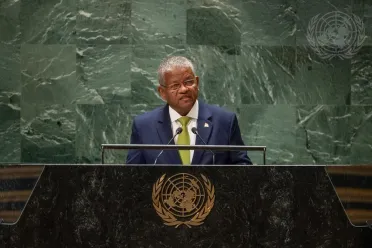Statement
Statement summary
WAVEL RAMKALAWAN, President of Seychelles, said that trust and solidarity form the bedrock of a functional multilateral order. As the challenge to global peace, security and prosperity takes on new dimensions, the lessons of the past become more relevant. The 2030 Agenda — a transformative blueprint for sustainable development — is a road map to eradicate poverty, promote human rights and protect the planet, he stressed, calling on those present to address imbalances — inequality, poverty, hunger and environmental degradation — and align their national polices with that document. Recognizing that by forging strategic alliances, States can leverage resources, expertise and influence to catalyse change, he highlighted the potential of South-South cooperation for knowledge exchange and development. Against this backdrop, through the African Peer Review Mechanism and the voluntary national review, Seychelles seeks to consolidate its political and socioeconomic successes, standing ready to share its experience with other countries.
He went on to state that development partners must deliver on the Addis Ababa Action Agenda by scaling up Sustainable Development Goals financing, also noting that international financial institutions should embrace reform to enable development funding for vulnerable countries. “Seychelles firmly believes in the critical importance of adopting a multidimensional vulnerability index that fully responds to the needs of small island developing States,” he underscored, also emphasizing the importance of impact investment, public-private partnerships and debt relief to yield results for the African Union’s Agenda 2063 and the fourth International Conference on Small Island Developing States in 2024. Commending the Sustainable Development Goals Stimulus, aimed at transforming the global financial system, he said that international financial institutions must collaborate for a sustainable future.
Also noting that addressing the climate crisis is an immediate necessity, he reiterated his country’s commitment to renewable energy and energy efficiency. “But as a small island developing State, we lack the capacity and infrastructure to develop these solutions fully,” he added, underscoring that the Organisation for Economic Co-operation and Development (OECD) and the Group of 20 (G-20) member States — as major emitters — must take decisive actions to tackle climate change. Spotlighting nature-based solutions, exemplified by Seychelles’ pioneering of blue bonds and blue economy, he paid tribute to Bermuda and Tonga, which started harnessing wave energy towards clean energy future. “Seychelles will continue the same ambitious approach as we assume the Presidency of the SIDS [small island developing States] dock from Tonga,” he stressed, also highlighting the Small Island Developing States Coalition for Nature, launched by Belize, Cabo Verde, Samoa and his country.
“This is clear evidence that SIDS [small island developing States] continue to lead by example — doing more than our fair share to alleviate the pressure being exerted on our planet,” he continued, stating that through such cooperation States can achieve impactful outcomes, as demonstrated by the recent adoption of the High Seas Treaty. Calling on those present to embrace the world’s interconnectedness, he said that Seychelles — a nation uniquely positioned in the Indian Ocean — knows firsthand the significance of global cooperation in addressing climate change, ocean conservation and marine security. Reiterating his country’s commitment to marine conservation, protecting vast ocean area and marine ecosystems, he emphasized: “We cannot succeed alone. We call upon the global community to prioritize sustainability, transition to clean energy and preserve our ecosystems for the prosperity of all.”
President Wavel Ramkalawan of the Seychelles emphasized that the international community must accelerate joint efforts to make transformative advancements on the SDGs.
“We must prioritize SDG implementation at all levels,” he said, noting the need to align national policies and strategies with the objectives of the 2030 Agenda, while strengthening partnerships with all stakeholders.
He called on development partners to deliver on their Addis Ababa Action Agenda promises on development finance and on international financial institutions to “embrace reform” and ensure that the unique needs of vulnerable countries are considered in access to development financing.
Reiterated that addressing the climate crisis “is no longer optional – it is an immediate necessity,” President Ramkalawan expressed Seychelles’ commitment to renewable energy and energy efficiency.
Full statement
Read the full statement, in PDF format.
Photo

Previous sessions
Access the statements from previous sessions.
